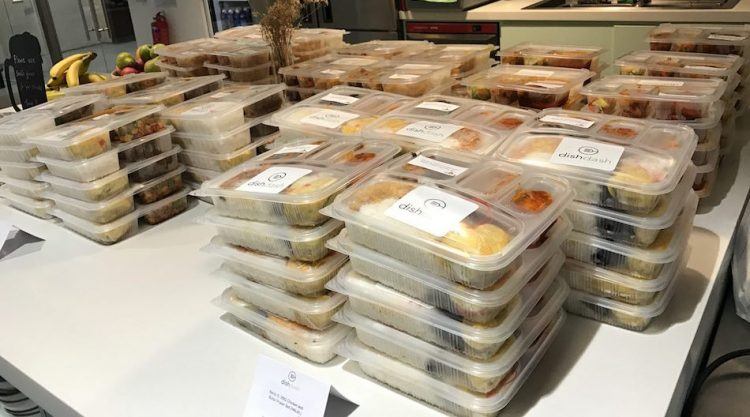
DishDash’s lovingly packed meals. Photo credit: DishDash.
Too much to do, too little time – work just keeps piling up so you can’t even afford to line up for a good lunch. You end up grabbing whatever’s easiest, or spend more ordering in. If only your employer provided food as a perk.
But what if your employer does want to provide you this perk – after all, a happy staff means increased productivity – how does it cater to your various needs and preferences?
That’s the problem DishDash solves. Based out of Singapore, the 500 Startups-backed outfit lets corporates buy hundreds of meals from multiple restaurants in a single order, then delivers it in 15 minutes without a fee. Menus range in taste, from Asian to Western. Those menus also accommodate dietary restrictions like vegetarian or Halal diets. Apart from daily meals for staff, DishDash provides catering for team meetings and corporate events – all ordered in advance.
Data-focused
But there’s a twist. With each dish, the startup allows customers to track nutritional information like ingredients, calories, and sodium levels. All this data is available on the DishDash dashboard, where users also place their orders.
That doesn’t mean, however, that the firm serves only healthy food, the co-founders quickly clarified. “It’s easier for an individual to choose better habits when they’re aware of what they’re consuming,” explains Kim Ngo.
“It’s more of awareness, not a ‘healthy’ branding. It’s laying it all in front of our customers so they see what they’re eating,” adds Chris Schneider.
Because DishDash tracks this data, it enables employees to design custom meal plans. It also empowers HR departments to look at things like cohort analysis to determine if higher absenteeism rates correlate with unhealthy diets.
DishDash is upending the traditional catering industry, which is quite old-school, largely doing things manually, and offers limited food variety – often with no consideration for dietary restrictions.
For its restaurant partners, DishDash allows access to new customers and removes the hassle of taking orders and doing deliveries on their own. The startup has runners but doesn’t own a fleet of vehicles, only rents them. It gets a cut of the sales through its platform.
“Catering is one of the biggest corporate benefit programs. We estimate the corporate catering market in Singapore alone to be about SGD 500 million (US$350 million),” says Kim, citing their own research and a study by Euromonitor.
Early traction

Co-founders Chris Schneider and Kim Ngo. Photo credit: DishDash
The idea didn’t come to Kim out of the blue. Before setting up her own company, the food trouble was a pain she shared with many professionals like her. “Because my work was so important and I always had deadlines, I kind of just grabbed what was available. I thought there had to be a better way for me to consume food.”
Born and raised in Silicon Valley, Kim has over a decade’s experience in tech startups under her belt. She was with online design label Tobi and MediaSpike, a VR company funded by Andreessen Horowitz and Google Ventures, before moving to Singapore to work for Facebook and 500 Startups. At Facebook, she enabled game developers across Southeast Asia to monetize their games by integrating with the social network’s technology. At 500, she worked closely with managing partner Khailee Ng, helping grow their regional fund. The concept for DishDash firmed up as she was leaving the VC.
“When I joined 500, I always told Khailee my dream was to build my own startup and he was extremely supportive. I had to get my husband on board because of the big jump. I was walking away from a full-time job,” she recalls.
An investor introduced Kim to Chris, a banker-turned-data scientist at Rocket Internet’s Foodpanda. A health buff, Chris loved the concept behind DishDash. “I have a background in banking and the working hours there were anywhere between 12-15 hours a day. Sitting on the desk all day and you don’t move at all – I had to find a way to eat right.”
It was as if the stars were all aligned, Kim says. Armed with a seed investment from 500 Startups, she and Chris decided to take the plunge and set up their own firm in February 2016. The duo used the money to build their MVP and launch an operational team to penetrate Singapore’s Central Business District.
DishDash is growing at a monthly rate of up to 40 percent.
Kim’s vast network and Chris’ eagle-eye on numbers and planning have driven the company’s traction since its inception. DishDash counts more than 300 corporate clients in the city-state, with revenue growing up to 40 percent month-on-month. Its clients include Fortune 500 Companies like MasterCard, Morgan Stanley, and Expedia.
Its focus on corporates is what sets it apart from online food delivery startups in the region like Foodpanda and Deliveroo, which just added business accounts as a tier.
“We move volume. It’s not one guy delivering to one customer,” says Kim. “It’s one guy delivering hundreds of meals to a building. The cost for us stays the same as the order to the same location increases.”
“We only work with corporate clients so if some random house wanted me to deliver to them, I wouldn’t deliver to them. We service high-density corporate areas,” she elaborates.
In Europe and the US, there are corporate catering services such as City Pantry, CaterWings, ezCater, and ZeroCater, but DishDash’s unique value-add is the wellness data it supplies clients.
Without revealing their “secret sauce,” Chris claims they have a super-efficient, lean operation, enough that “we don’t have to ramp up on runners as our revenue grows higher.”
The DishDash team aims to raise a series A round by the end of this year to take the platform to other major Asian cities.
It plans to bolster its current relationships with multinational corporations in Singapore and enter markets where those corporations have a presence.
This post No more sad desk lunches if this 500 Startups-backed service has its way appeared first on Tech in Asia.
from Tech in Asia https://www.techinasia.com/no-more-sad-desk-lunches-with-dishdash
via IFTTT
No comments:
Post a Comment